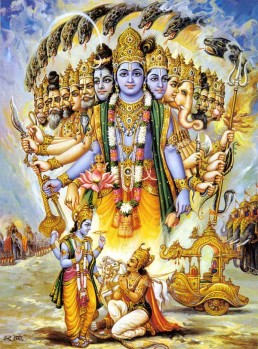Swami Chinmayananda
Swami Chinmayananda Commentary
From every experience, all intelligent men try to gather their own conclusions, which alone, in fact, constitute true knowledge. Arjuna had a great experience, too subtle for words to express, or for his intellect to comprehend, in all
its entirety. But from what he saw, he tries to draw certain conclusions. Crystallised into his understanding, the conclusions are that the Power behind this Cosmic Form is that which is the Imperishable Supreme Truth.
When we see all the waves playing on the surface of the ocean, manifesting and disappearing after a temporary existence into the very waters from which they rose, we generally conclude that the ocean is the source of all waves. It becomes at once the rest-house for the waves, or the treasure-house for all the disturbances. Similarly, Arjuna comes to the intelligent conclusion that Krishna, as the Cosmic-Form, is the very Substratum from which the pluralistic world of phenomena arises, exists in, and merges into. The Universe (Vishwa) mentioned here, is not merely the astronomers’ universe of physical things, but, in Vedanta, Vishwa is the sum-total experience of everyone, gained through the individual instruments of perception, feeling and understanding. The Lord is the foundation (Nidhaanam) for the entire universe of disturbances, experienced by us at our physical, mental and intellectual levels.
Things that change can continue to do so only on a changeless substratum. The world-of-change plays ever to the tune of Time and Space. But, in order that we may feel a continuity of the happenings and thereby gain a comprehensive experience of the total, there must be one constant and changeless “Knowing-principle” that registers the happenings, without itself in the least being involved in the change. That truth is the Self, and the Self alone is that which could take upon itself the stupendous Universal-Form (Vishwaroopa). Keeping these ideas in mind, Arjuna declares that He who has transformed Himself into this Wonder-Form is the One Changeless Truth, that permeates the entire realm of changes and modifications.
In India, to the Hindus, the protector of his Dharma is not a mortal king, or a priest class. The Supreme alone is its guardian, for the Hindus are not the followers of any accidental prophet, who has a fleeting historical reality and a limited mission of serving his immediate generation with the best he had. To the Hindu, THE ETERNAL TRUTH
IS HIS GOAL, HIS MASTER AND HIS WAY. We demand no mortal power with its poison-gas and atom-bomb to protect our Dharma.
THAT YOU ARE THE ANCIENT PURUSHA, IS MY OPINION — In Vedanta, the very physical structure is considered as a Capital-city with nine gates, each controlled and guarded by its presiding deity. That which dwells in the city, here meaning the body, is in Sanskrit ‘Purusha.’ In the context of the stanza, it only means that the solution for the riddle of life, which is the source, or substratum of the whole universe, is to be sought, not among the world-of-objects but within the very layers of personalities in us, until we discover it as the Purusha, the Eternal. The Conscious Principle, which is the Spark-of-life in everyone, is here indicated to be the very Eternal Truth which alone can take up the Form-Universal, as it stands now in front of Arjuna’s bewildered gaze.
MOREOVER:
Adi Sankara Commentary
Tvam, You; are the aksaram, Immutable; the paramam, supreme One, Brahman; veditavyam, to be known-by those aspiring for Liberation. You are the param, most perfect; nidhanam, repository-where things are deposited, i.e. the ultimate resort; asya visvasya, of this Universe, of the entire creation. Further. You are the avyayah, Imperishable-there is no decay in You; the sasvata-dharma-gopta, Protector (gopta) of the ever-existing (sasvata) religion (dharma). You are the sanatanah, eternal; transcendental purusah, Person. This is me, my; matah, belief-what is meant by me. Moreover,
The Bhagavad Gita with the commentary of Sri Sankaracharya – Translated by Alladi Mahadeva Sastry
Holy Geeta – Commentary by Swami Chinmayananda
The Bhagavad Gita by Eknath Easwaran – Best selling translation of the Bhagavad Gita
The Bhagavad Gita – Translation and Commentary by Swami Sivananda
Bhagavad Gita – Translation and Commentary by Bhaktivedanta Swami Prabupadha
Srimad Bhagavad Gita Chapter 11 – Verse 18 – 11.18 tvamaksaram paramam – All Bhagavad Gita (Geeta) Verses in Sanskrit, English, Transliteration, Word Meaning, Translation, Audio, Shankara Bhashya, Adi Sankaracharya Commentary and Links to Videos by Swami Chinmayananda and others – 11-18

